浙江工业大学 国际商法考试重点
国际商法期末重点(至诚)

国际商法复习重点第一章导论一、国际商法的概念国际商法是调整国际商事交易和商事组织的各种关系的法律规范的总称。
二、国际商法的渊源1、国际条约。
是国际商法的重要渊源。
条约对缔约国有约束力、各国必须遵守。
如《联合国国际货物买卖合同公约》、《国际汇票和国际本票公约》、《国际货物买卖合同适用法律公约》、《产品责任适用法律公约》等。
2、国际惯例。
(世界通用的语言)贸易惯例虽然不是法律,不具有法律的普遍约束力,但按照各国的法律,一旦当事人在合同中采用了某项惯例,它对合同双方当事人就有约束力。
如《国际贸易术语解释通则》、《跟单信用证统一惯例》。
三、大陆法系与英美法系的区别1、法律构成上,大陆法系以成文法为主,英美法系国家则主要采用判例形式。
2、立法上,大陆法国家采用法典形式,英美法系国家的成文法主要以单行法规形式。
3、司法上,大陆法系国家法官审理案件只能依据成文法,法官只能适用法律,不能创造法律;英美法系国家的法官审理案件时强调“遵循先例”,即判例,法官可依成文法,也可依判例法,并可创造法律。
4、诉讼程序上,大陆法系国家采用审讯制,法院判决书的推理方式一般是演绎法;英美法系国家采用辩论制,法院判决书的推理方式是归纳法。
四、国际商事合同的法律适用1、论意思自治原则意思自治原则是指在合同法律关系方面,当事人既然可以依据“契约自由”原则按照自己的意志创设某种权利义务关系,那么,他们当然有权自行决定合同应适用的法律。
无限意思自治原则主张当事人选择法律的权利是绝对的,不受任何限制。
有限意思自治远原则主张当事人选择的准据法必须与合同有内在的联系,当事人不得选择与合同没有实际联系的国家的法律作准据法。
2、最密切联系原则(数量原则、质量原则/特征原则)第二章国际货物买卖法一、公约的适用范围1、营业地在不同国家的当事人之间所订立的货物销售合同。
2、这些国家是缔约国;或者依据国家私法规则导致适用某一缔约国的法律。
* 关于合同的效力问题,公约没有提到。
国际商法重点期末考试
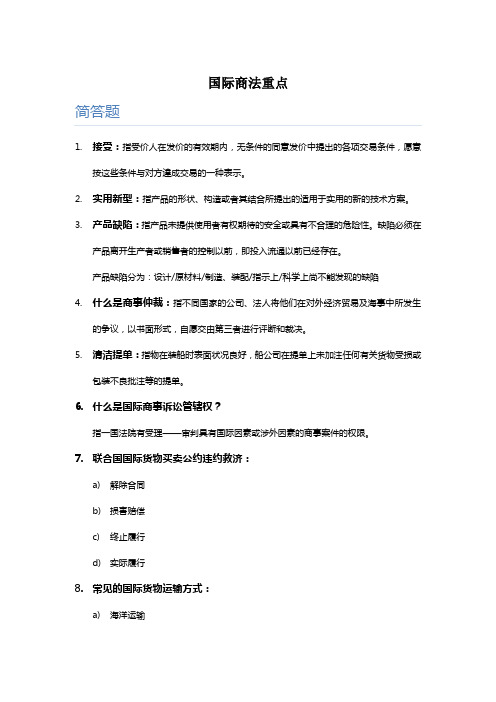
国际商法重点简答题1.接受:指受价人在发价的有效期内,无条件的同意发价中提出的各项交易条件,愿意按这些条件与对方達成交易的一种表示。
2.实用新型:指产品的形状、构造或者其结合所提出的适用于实用的新的技术方案。
3.产品缺陷:指产品未提供使用者有权期待的安全或具有不合理的危险性。
缺陷必须在产品离开生产者或销售者的控制以前,即投入流通以前已经存在。
产品缺陷分为:设计/原材料/制造、装配/指示上/科学上尚不能发现的缺陷4.什么是商事仲裁:指不同国家的公司、法人将他们在对外经济贸易及海事中所发生的争议,以书面形式,自愿交由第三者进行评断和裁决。
5.清洁提单:指物在装船时表面状况良好,船公司在提单上未加注任何有关货物受损或包装不良批注等的提单。
6.什么是国际商事诉讼管辖权?指一国法院有受理——审判具有国际因素或涉外因素的商事案件的权限。
7.联合国国际货物买卖公约违约救济:a)解除合同b)损害赔偿c)终止履行d)实际履行8.常见的国际货物运输方式:a)海洋运输b)铁路运输c)航空运输d)公路、内河和邮包运输9.票据的特征:a)设权凭证b)流通证券c)要式证券d)文义证券e)无因证券f)债券证券10.汇票的种类:按出票人不同:a)银行汇票b)商业汇票按付款日期:a)即期汇票b)远期汇票根据汇票上记载收款人的方式不同a)记名汇票b)指示汇票c)无记名汇票11.专利权终止原因:a)专利期限满b)未按照规定缴纳年费c)专利权人以书面声明放弃其专利权d)专利权人死亡又无人继承e)专利权被专利复审委员会宣告无效f)专利权终止后,由国务院专利行政部门登记并公告12.美国产品责任诉讼中常见的抗辩有哪些?a)担保的排除或限制b)与有疏忽与相对疏忽c)自担风险d)非正常使用产品或误用、滥用产品e)擅自改动产品f)带有不安全因素的产品分析题1.如果你要创业,你选择什么样的企业组织形式,说明理由。
答:我选择有限责任公司的企业形式。
理由:2.股份有限公司和有限责任公司的区别3.合同履行中的抗辩权a)同时履行抗辩权指无先后履行顺序的双务合同,由于一方不履行或履行不符合约定,另一方因此而享有的拒绝对方要求自己履行相应合同义务的权利。
国际商法考试复习提纲
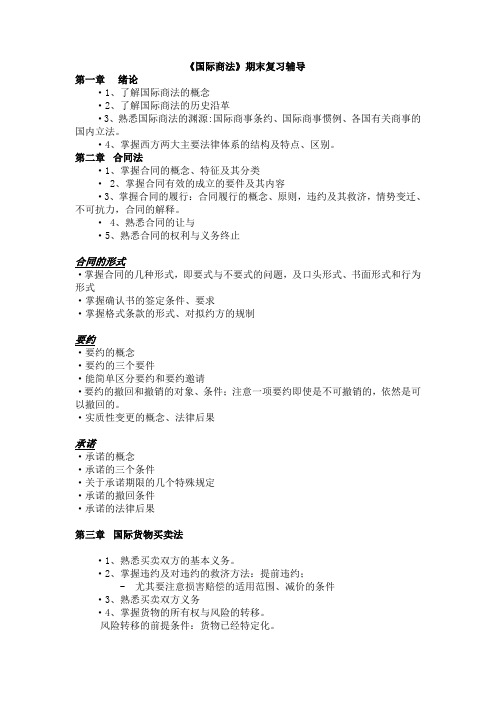
《国际商法》期末复习辅导第一章绪论·1、了解国际商法的概念·2、了解国际商法的历史沿革·3、熟悉国际商法的渊源:国际商事条约、国际商事惯例、各国有关商事的国内立法。
·4、掌握西方两大主要法律体系的结构及特点、区别。
第二章合同法·1、掌握合同的概念、特征及其分类· 2、掌握合同有效的成立的要件及其内容·3、掌握合同的履行:合同履行的概念、原则,违约及其救济,情势变迁、不可抗力,合同的解释。
· 4、熟悉合同的让与·5、熟悉合同的权利与义务终止合同的形式·掌握合同的几种形式,即要式与不要式的问题,及口头形式、书面形式和行为形式·掌握确认书的签定条件、要求·掌握格式条款的形式、对拟约方的规制要约·要约的概念·要约的三个要件·能简单区分要约和要约邀请·要约的撤回和撤销的对象、条件;注意一项要约即使是不可撤销的,依然是可以撤回的。
·实质性变更的概念、法律后果承诺·承诺的概念·承诺的三个条件·关于承诺期限的几个特殊规定·承诺的撤回条件·承诺的法律后果第三章国际货物买卖法·1、熟悉买卖双方的基本义务。
·2、掌握违约及对违约的救济方法:提前违约;- 尤其要注意损害赔偿的适用范围、减价的条件·3、熟悉买卖双方义务·4、掌握货物的所有权与风险的转移。
风险转移的前提条件:货物已经特定化。
违约·违约的两个分类·根本违约的概念、条件、法律后果(赋予守约方宣告合同无效的权利)·预期违约的概念、原因、法律后果及具体应用(注意担保不充分的考点)·违约免责中的不可抗力(重点要注意不可抗力的法律后果,及免责的前提条件)第四章票据法·1、熟悉票据法的含义,掌握各国票据立法上的差异。
[VIP专享]国际商法考试重点
![[VIP专享]国际商法考试重点](https://img.taocdn.com/s3/m/be4654a2f90f76c661371ae1.png)
国际商法第一章【国际商法】是(International Commercial Law)指调整国际商事(主体在从事国际商事交易活动中所形成的各种关系)的法律规范的总和。
【国际条约】是国际法主体(主要但不仅是国家)签订的确定它们之间权利义务关系的协议。
【国际惯例】是在国际商事活动的某一领域,经过长期实践所形成的习惯做法。
【法系】即比较法学家按照历史传统和形式特征对世界各国法律所作出的分类。
【英国的“先例约束力原则”】:1、上议院的判决是具有约束力的先例,对全国各级审判机关都有约束力。
2、上诉法院的判决可构成对下级法院有约束力的先例,而且对其本身也有约束力。
3、高级法院每个的判决对一切低级法院有约束力,对其他各庭及王冠法院有说服力。
*只有上诉法院、高级法院和上议院的判决可以构成先例。
【美国的“先例约束力原则”】:1、在州法方面,州的下级法院须受其上级法院判决的约束,特别是受州最高法院判决的约束。
2、在联邦法方面,须受联邦法院判决的约束,特别是受美国最高法院判决的约束。
3、联邦法院在审理涉及联邦法的案件时,须受其上级联邦法院判决的约束;而在审理涉及州法的案件时,则须受相应的州法院判决的约束,但以不违反联邦法为原则。
4、联邦和州的最高法院不受他们以前确立的先例的约束。
【英美法系的结构具有两大特点】:一是法律的二元结构,二是重视程序法。
【普通法和衡平法的区别】:1、救济方法不同。
普通法只有金钱赔偿和返还原物两种救济方法,衡平法新增了实际履行和禁令。
2、诉讼程序不同。
普通法法院设陪审团,采取口头询问方式审理案件, 衡平法法院不设陪审团,采书面方式审理案件。
3、法院的组织系统不同。
王座法庭适用普通法的诉讼程序,枢密大臣法庭适用衡平法的诉讼程序。
4、法律术语不同起诉:suit Action 权利:InterestsRights判决: Decree Judgment 损害赔偿:Compensation Damages 【大陆法系和英美法系的区别】:1、法律的主要渊源不同大陆法系强调成文法的作用,主张编纂法典。
国际商法复习重点.doc
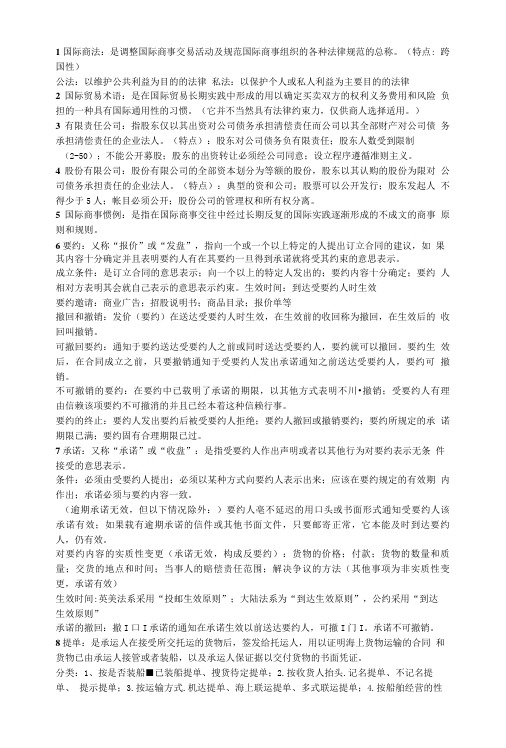
1国际商法:是调整国际商事交易活动及规范国际商事组织的各种法律规范的总称。
(特点: 跨国性)公法:以维护公共利益为目的的法律私法:以保护个人或私人利益为主要目的的法律2国际贸易术语:是在国际贸易长期实践中形成的用以确定买卖双方的权利义务费用和风险负担的一种具有国际通用性的习惯。
(它并不当然具有法律约束力,仅供商人选择适用。
)3有限责任公司:指股东仅以其出资对公司债务承担清偿责任而公司以其全部财产对公司债务承担清偿责任的企业法人。
(特点):股东对公司债务负有限责任;股东人数受到限制(2-50);不能公开募股;股东的出资转让必须经公司同意;设立程序遵循准则主义。
4股份有限公司:股份有限公司的全部资本划分为等额的股份,股东以其认购的股份为限对公司债务承担责任的企业法人。
(特点):典型的资和公司;股票可以公开发行;股东发起人不得少于5人;帐目必须公开;股份公司的管理权和所有权分离。
5国际商事惯例:是指在国际商事交往中经过长期反复的国际实践逐渐形成的不成文的商事原则和规则。
6要约:乂称“报价”或“发盘”,指向一个或一个以上特定的人提出订立合同的建议,如果其内容十分确定并且表明要约人有在其要约一旦得到承诺就将受其约束的意思表示。
成立条件:是订立合同的意思表示;向一个以上的特定人发出的;要约内容十分确定;要约人相对方表明其会就自己表示的意思表示约束。
生效时间:到达受要约人时生效要约邀请:商业广告;招股说明书;商品目录;报价单等撤回和撤销:发价(要约)在送达受要约人时生效,在生效前的收回称为撤回,在生效后的收回叫撤销。
可撤回要约:通知于要约送达受要约人之前或同时送达受要约人,要约就可以撤回。
要约生效后,在合同成立之前,只要撤销通知于受要约人发出承诺通知之前送达受要约人,要约可撤销。
不可撤销的要约:在要约中已载明了承诺的期限,以其他方式表明不川•撤销;受要约人有理由信赖该项要约不可撤消的并且已经本着这种信赖行事。
国际商法考试范围终极版
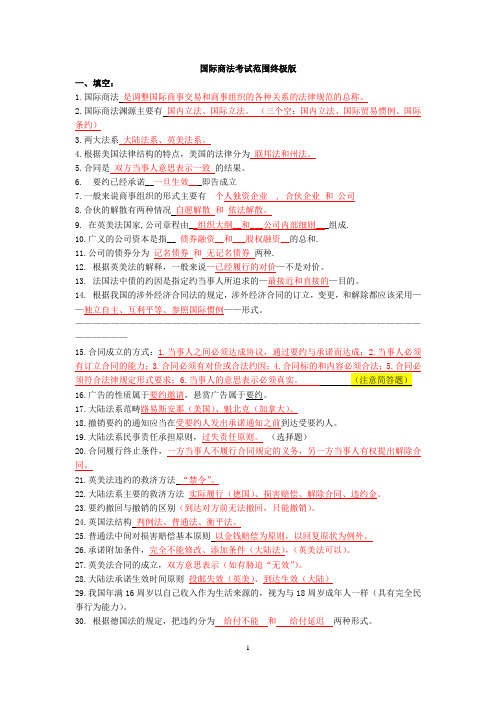
国际商法考试范围终极版一、填空:1.国际商法是调整国际商事交易和商事组织的各种关系的法律规范的总称。
2.国际商法渊源主要有国内立法、国际立法。
(三个空:国内立法、国际贸易惯例、国际条约)3.两大法系大陆法系、英美法系。
4.根据美国法律结构的特点,美国的法律分为联邦法和州法。
5.合同是双方当事人意思表示一致的结果。
6. 要约已经承诺__一旦生效___即告成立7.一般来说商事组织的形式主要有个人独资企业 , 合伙企业和公司8.合伙的解散有两种情况自愿解散和依法解散。
9. 在英美法国家,公司章程由__组织大纲__和___公司内部细则___组成.10.广义的公司资本是指__债券融资__和___股权融资__的总和.11.公司的债券分为记名债券和无记名债券两种.12. 根据英美法的解释,一般来说—已经履行的对价—不是对价。
13. 法国法中债的约因是指定约当事人所追求的—最接近和直接的—目的。
14. 根据我国的涉外经济合同法的规定,涉外经济合同的订立,变更,和解除都应该采用——独立自主、互利平等、参照国际惯例——形式。
—————————————————————————————————————————————15.合同成立的方式:1.当事人之间必须达成协议,通过要约与承诺而达成;2.当事人必须16.广告的性质属于要约邀请,悬赏广告属于要约。
17.大陆法系范畴路易斯安那(美国)、魁北克(加拿大)。
18.撤销要约的通知应当在受要约人发出承诺通知之前到达受要约人。
19.大陆法系民事责任承担原则,过失责任原则。
(选择题)20.合同履行终止条件,一方当事人不履行合同规定的义务,另一方当事人有权提出解除合同。
21.英美法违约的救济方法“禁令”。
22.大陆法系主要的救济方法实际履行(德国)、损害赔偿、解除合同、违约金。
23.要约撤回与撤销的区别(到达对方前无法撤回,只能撤销)。
24.英国法结构判例法、普通法、衡平法。
25.普通法中间对损害赔偿基本原则以金钱赔偿为原则,以回复原状为例外。
国际商法期末考试整理资料

第一章国际商法是调整国际商事交易和商事组织的各种关系法律规范的总合。
1两大法系的区别1、法律结构不同。
大陆法系强调成文法的作用,主张编纂法典。
英美法系强调判例法的作用,实体法和程序法合一。
2、诉讼程序不同。
大陆法系采用“纠问式”,法官居于主导地位。
英美法系采用“对抗式”,法官充当消极的中立裁定者的角色。
3 、对法的分类不同。
公法与私法。
普通法与衡平法。
4 、法律术语不同。
2普通法和衡平法二者的区别(1)救济方法不同。
普通法只有金钱赔偿和返还原物两种救济 方法, 衡平法新增了实际履行和禁令。
(2)诉讼程序不同。
普通法法院设陪审团,采取口头询问方式审理案件, 衡平法法院不设陪审团,采书面方式审理案件。
(3 )法院的组织系统不同。
王座法庭适用普通法的诉讼程序,枢密大臣法庭适用衡平法的诉讼程 序。
(4)法律术语不同第二章有限合伙是指由至少一名普通合伙人和至少一名有限合伙组成的企业,前者对合伙企业的债务负无限责任,后者则只负有限责任,即仅以其出资额为限对合伙承担有限责任公司的章程是规定公司的宗旨,资本,组织结构,名称等对内对外事务的法律文件,是规范公司活动的根一大法。
公司资本股份公司的资本,又称为股本,是指基于公司章程的规定,由股东出资为基础而形成的公司财产的总和。
股份与股票股份是股份公司股东出资,是公司资本按比例分割后所形成的均等份额,它构成公司的基本组成单位。
每一股份代表一定的金额,每股的金额应当相等股人有限公司的股份表现为股票。
股票代表股权的文本。
也是股东身份的证明文件。
比较个人企业、合伙、公司之间的优缺点公司:1.公司具有独立的法人资格2.有权以自己的名义拥有财产3.享受权利和承担义务4.公司是种“资本的组合”个人企业100合伙92股份有限责任公司与有限责任公司之间的区别P56(1)两种公司在成立条件和募集资金方面有所不同。
(2)两种公司的股份转让难易程度不同。
(3)两种公司的股权证明形式不同。
国际商法考试复习知识点
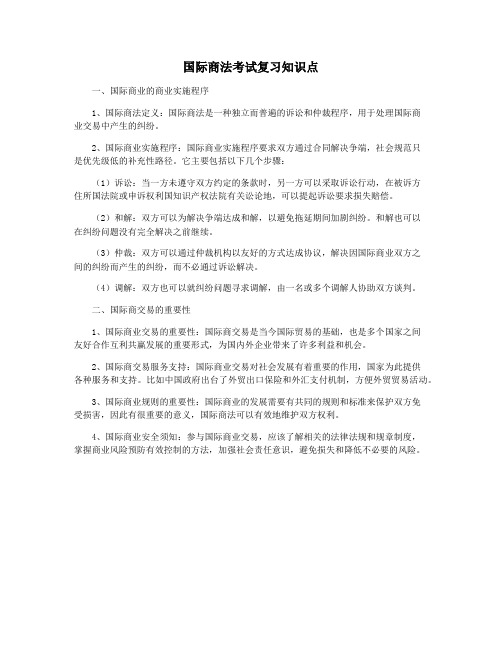
国际商法考试复习知识点
一、国际商业的商业实施程序
1、国际商法定义:国际商法是一种独立而普遍的诉讼和仲裁程序,用于处理国际商
业交易中产生的纠纷。
2、国际商业实施程序:国际商业实施程序要求双方通过合同解决争端,社会规范只
是优先级低的补充性路径。
它主要包括以下几个步骤:
(1)诉讼:当一方未遵守双方约定的条款时,另一方可以采取诉讼行动,在被诉方
住所国法院或申诉权利国知识产权法院有关讼论地,可以提起诉讼要求损失赔偿。
(2)和解:双方可以为解决争端达成和解,以避免拖延期间加剧纠纷。
和解也可以
在纠纷问题没有完全解决之前继续。
(3)仲裁:双方可以通过仲裁机构以友好的方式达成协议,解决因国际商业双方之
间的纠纷而产生的纠纷,而不必通过诉讼解决。
(4)调解:双方也可以就纠纷问题寻求调解,由一名或多个调解人协助双方谈判。
二、国际商交易的重要性
1、国际商业交易的重要性:国际商交易是当今国际贸易的基础,也是多个国家之间
友好合作互利共赢发展的重要形式,为国内外企业带来了许多利益和机会。
2、国际商交易服务支持:国际商业交易对社会发展有着重要的作用,国家为此提供
各种服务和支持。
比如中国政府出台了外贸出口保险和外汇支付机制,方便外贸贸易活动。
3、国际商业规则的重要性:国际商业的发展需要有共同的规则和标准来保护双方免
受损害,因此有很重要的意义,国际商法可以有效地维护双方权利。
4、国际商业安全须知:参与国际商业交易,应该了解相关的法律法规和规章制度,
掌握商业风险预防有效控制的方法,加强社会责任意识,避免损失和降低不必要的风险。
- 1、下载文档前请自行甄别文档内容的完整性,平台不提供额外的编辑、内容补充、找答案等附加服务。
- 2、"仅部分预览"的文档,不可在线预览部分如存在完整性等问题,可反馈申请退款(可完整预览的文档不适用该条件!)。
- 3、如文档侵犯您的权益,请联系客服反馈,我们会尽快为您处理(人工客服工作时间:9:00-18:30)。
1.Public international law: the law of nations resolved issues between two or more states, and the legal relationships between and among states.2.Private international law: the laws that govern conduct between people and corporations from different states.3.Diplomacy: the process of reconciling the parties to a disagreement by negotiation, mediation, or inquiry.4.Mediation: Mediation involves the use of a third party who transmits and interprets the proposals of the principle parties and sometimes advances independent proposals.5.Inquiry: a process used to determine a disputed fact or facts.6.Limited liability company: A corporation owned by members that does not issue negotiable share certificates and is subject to minimal public disclosure laws.7.Silent partnership: A secret relationship between two or more persons, one of whom carries on a business in his name alone without revealing the participation of the other who has limited personal liability.8.Business trust:A business arrangement in which the owners of a property(the beneficiaries) transfer legal title to that property to a trustee who then manages it for them.9.joint stock company:An unincorporated association of persons whose ownership interests are represented by transferable shares. The shareholders have unlimited personal liability.10.Patent: A statutory privilege granted by the government to inventors, and to others deriving their rights from the inventor, for a fixed period of years, to exclude other persons from manufacturing, using, or selling a patented product or from utilizing a patented method or process.11.Copyright:A copyright is title to certain pecuniary rights and, in most countries, certain moral rights for a specified period of time.12.Preferred stock: Preferred stock entitles owners to a guaranteed divided, a priority at the time of liquidation, or some other preference over ordinary shareholders.13.National treatment principle: the second manifestation of the principle of nondiscrimination that appears in GATT.Once foreign trade good goods were imported into one contracting state from another,the foreign goods had to be treated the same way as domestic goods.14.A Himalaya Clause: The clause that extends liability limits of the conventions to carriers’ employees, agents, and even independent contractors. It entitles them to claim the protection of the Hague or the Hague-Visby Rules.15.Offer: A proposal addressed to specific persons indicating an intention by the offeror to be bound to the sale or purchase of particular goods for a price.16.Acceptance: A statement or conduct by the offeree indicating assent that is communicated to the offeror.17.A bill of lading: An instrument issued by an ocean carrier to a shipper with whom the carrier has entered into a contract for the carriage of goods.1.The source of international law:Article38(1) of the Statute of the ICJ lists the sources:(a)international conventions, whether general or particular, establishing rules expressly recognized by the contesting states(b)international custom, as evidence of a general practice accepted as law(c)the general principles of law recognized by civilized nations(d)subject to the provisions of Article 59, judicial decisions and the teaching of the most highly qualified publicists of the various nations, as subsidiary means for the determination of rules of law.2.The carriers’ duties under a bill of lading:(a) Making the ship seaworthy(b) properly manning, equipping, and supplying the ship(c) Making the holds, refrigerating, and cool chambers, and all other parts of theship in which goods are carried, fit and safe for their reception, carriage, and preservation(d) Properly and carefully loading, handing, stowing, carrying, keeping, caring for, and discharging the goods carried.3.the three kinds of international relationship international law deals with?(1)those between states and states(2)those between states and persons(3)those between persons and persons.4.Fundamental breach:a breach of contract committed by one of the parties is fundamental if it results in such detriment to the other party as substantially to deprive him of what he is entitled to expect under the contract, unless the party in breach did not foresee and a reasonable person of the same kind in the same circumstances would not have foreseen such a result.5.The three concerns ILO conventions and recommendations have dealt with:(a)the basic issues of labor protection, such as employment conditions and the protection of women and children(b)setting up the basic machinery and institutions that are needed to make labor protection effective(c)promote and protect the human rights and fundamental freedoms of workers.6.National treatment:national treatment is giving services and service suppliers of other members “treatment no less favorable” than what the member grants its own like services and service suppliers.7.Market access:market access is defined as giving services and service suppliers of other members “treatment no less favorable” than that listed in the member’s schedule.8.The difference between branches and subsidiaries:(1)A branch is a unit of the parent company, which is not separately incorporated. And the parent maintains its direct control. A subsidiary is an independently organized and incorporated company.(2)The parent has to assume all of the risk of branches but the subsidiarie’s company status insulates the parent from unlimited liability.(3)The foreign branches are often taxed at higher rates than local firms but as locally organized companies, the subsidiaries are commonly entitled to certain tax benefits.9.The four basic functions the WTO serves:(a) to implement, administer, and carry out the WTO Agreement and its annexes(b) to act as a forum for ongoing multilateral trade negotiation(c) to serve as a tribunal for resolving dispute(d) to review the trade policies and practices of member states.10.Please name the qualifications of patented inventions:(a) An invention is new if no other inventor has obtained a patent for the same invention(b) it involves an inventive step if the “subject matter” of the invention was not “obvious at the time the invention was made to a person having ordinary skill in the art to which said subject matter pertains”(c) it is capable of industrial application if the product or process is one that can be used in industry or commerce.11.Describe and give comments on irrevocable and revocable letters of credit:Irrevocable(a)Description: Cannot be altered without the beneficiary’s express consent.(b)Comments: Preferred by beneficiaries because it provides the most security) Revocable(a)Description: Revocable by the issuing bank.(b)Comments: Dislike by beneficiaries because it provides the least security.12.Main points of advocates of international labor standards:(a) individual states are not inclined to enact domestic labor law. The adoption of an internationally effective agreement would keep multinational companies from practicing social dumping(b) the establishment of fair and equitable labor standards helps promote world peace(c) the establishment of uniform labor standards is a matter of both justice and humanity.13.The most important forms of national regulation include:(1) the regulation of competition(2) the regulation of injuries caused by defective products(3) the prohibition of sharp sales practices(4) the regulation of securities(5) the regulation of labor and employment(6) the establishment of accounting standards(7) taxation14.Why goods bought for personal, family or household use are excluded: (1)a double standard could arise if different rules governed sales by local shopkeepers to foreigners(2) many local laws protect consumers, and that protection would be lost if GISG applied.书本相应出处public international law 1private international law 1diplomacy 81mediation 82inquiry 83limited liability company 123silent partnership 123business trust 123joint stock company 123patent 357copyright 345preferred stock 129national treatment principle 247a Himalaya Clause 489offer 425acceptance 427a bill of lading 471the source of international law 5the carrier’s duties under a bill of lading?481the three kinds of international relationship international law deals with? 1 fundamental breach 436the three concerns ILO conventions and recommendations have dealt with? 315 national treatment 309market access 309the difference between branches and subsidiaries? 135 136the four basic functions the WTO serves? 250Please name the qualifications of patented inventions? 359Describe and give comments on irrevocable and revocable letters of credit? 528 What are main points of advocates of international labor standards? 315The most important forms of national regulation include? 139Why goods bought for personal, family or household use are excluded? 413。
